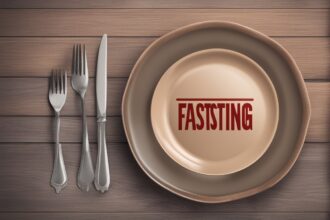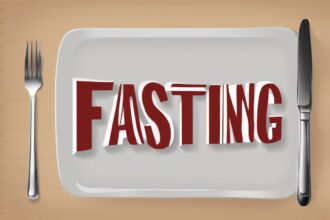Intermittent fasting has taken the wellness world by storm, promising benefits like weight loss, improved energy, and even better mental clarity. But with its rise in popularity comes a wave of confusion and half-truths. If you’ve ever Googled “intermittent fasting,” you’ve likely stumbled across a mix of glowing testimonials and dire warnings. So, what’s fact and what’s fiction? Let’s dive deep into the common misconceptions about intermittent diets, busting myths with evidence-based insights and practical know-how. I’ve been down this road myself—experimenting with fasting protocols for over three years—and I’m here to share what I’ve learned, alongside expert-backed perspectives, to help you separate the wheat from the chaff.
What Are Intermittent Diets, Anyway?
Before we tackle the myths, let’s get on the same page about what intermittent diets really are. At its core, intermittent fasting (IF) isn’t about what you eat but when you eat. It cycles between periods of eating and fasting, with popular methods like the 16/8 (fast for 16 hours, eat during an 8-hour window) or the 5:2 (eat normally for five days, restrict calories on two non-consecutive days). Sounds simple, right? Yet, this simplicity often breeds misunderstanding. People assume it’s a magic bullet or, worse, a dangerous fad. Neither is entirely true, and that’s where the common misconceptions about intermittent diets start creeping in.
If you’re new to IF, you might be picturing yourself starving for days on end. I remember feeling that way when I first started—terrified I’d be hangry 24/7. Spoiler: I wasn’t. But these fears are exactly why we need to clear the air. Curious about the basics before diving into myths? Check out our Intermittent Fasting 101 guide for a full breakdown.
Myth 1: Intermittent Fasting Means Starving Yourself
Let’s start with the big one: the idea that intermittent fasting is just a fancy term for starvation. I can’t tell you how many times I’ve heard, “Aren’t you just skipping meals and calling it a diet?” Not quite. Fasting isn’t about deprivation in the extreme sense; it’s about timing. During fasting windows, you’re not eating, sure, but the goal isn’t to suffer or malnourish yourself. Most IF plans ensure you still get enough calories and nutrients during eating periods. In my own 16/8 journey, I’ve found that I’m not hungry all the time—my body adjusted after a week or so, and I felt more in tune with my hunger cues.
Research backs this up. A 2020 study in the journal Obesity found that intermittent fasting doesn’t lead to significant muscle loss or nutritional deficiencies when done correctly—key phrase being “done correctly.” The misconception stems from equating fasting with crash diets, but they’re apples and oranges. Crash diets often slash calories indefinitely, while IF focuses on structured cycles. Still worried about feeling deprived? Start slow with a 12/12 schedule and work your way up. Your body’s smarter than you think—it adapts.
Myth 2: Intermittent Fasting Slows Down Your Metabolism
Here’s another whopper: the fear that fasting tanks your metabolism, grinding your fat-burning engine to a halt. I’ll admit, I bought into this at first. I mean, doesn’t skipping meals signal to your body that food is scarce, prompting it to conserve energy? That’s the logic, but the science tells a different story. Short-term fasting—like the kind in most intermittent diets—can actually boost metabolic rate temporarily due to increased norepinephrine, a hormone that revs up fat burning. A 2019 review in the New England Journal of Medicine highlighted that intermittent fasting doesn’t cause the metabolic slowdown seen in prolonged calorie restriction.
Now, let’s not get carried away. If you’re fasting for days without proper nutrition or pushing your body beyond its limits, yeah, you might see negative effects. Balance is key. I’ve had days where I overdid fasting early on—felt sluggish, not sharp—and learned to listen to my body. If you’re curious about metabolism myths in general, our post on Metabolism Myths Debunked dives deeper into the science.
Myth 3: Intermittent Fasting Is Only for Weight Loss
Picture this: you’re at a family dinner, and you mention you’re trying intermittent fasting. Someone inevitably asks, “Oh, are you trying to lose weight?” It’s a fair question, but it’s not the whole picture. One of the most common misconceptions about intermittent diets is that they’re solely a weight-loss tool. Sure, many folks start IF for that reason—and studies, like one from 2021 in JAMA Internal Medicine, show it can be effective for shedding pounds—but the benefits go way beyond the scale.
From personal experience, I’ve noticed sharper focus and steadier energy levels on fasting days. Science supports other perks too: improved insulin sensitivity, better heart health markers, and even potential longevity benefits through cellular repair processes like autophagy. Not everyone’s fasting to fit into skinny jeans—some are chasing mental clarity or managing blood sugar. So, next time someone assumes it’s just a diet, remind them: it’s a lifestyle tool with a buffet of benefits. Want to explore non-weight-loss perks? Read more in our Health Benefits of Fasting article.
Myth 4: Intermittent Fasting Isn’t Safe for Most People
Safety concerns are a hot topic when it comes to intermittent diets, and I get it—any change to how you eat can feel risky. There’s a pervasive myth that IF is dangerous or unsustainable for the average person. “Won’t it mess with my blood sugar?” or “Isn’t it bad for women’s hormones?” are questions I’ve fielded from friends. Truth is, while intermittent fasting isn’t for everyone, it’s generally safe for most healthy adults when approached sensibly.
Let’s break this down. Research, including a 2022 meta-analysis in Frontiers in Nutrition, shows that IF doesn’t pose significant risks for most people and can even improve metabolic health. That said, certain groups—pregnant or breastfeeding women, those with eating disorders, or individuals with specific medical conditions like diabetes—should steer clear or get medical clearance first. I remember chatting with a friend who has hypoglycemia; she tried IF without guidance and felt awful. Lesson learned: customization and caution matter. Always check with a healthcare pro if you’re unsure. The key is to start slow, stay hydrated, and don’t ignore warning signs like dizziness or extreme fatigue.
Myth 5: You Can Eat Whatever You Want During Eating Windows
Alright, let’s tackle a tempting myth: the notion that intermittent fasting gives you a free pass to scarf down pizza and donuts as long as it’s within your eating window. I wish! Early on, I fell into this trap—thinking the fasting hours “earned” me junk food. Spoiler alert: my energy crashed, and I felt worse than before. IF isn’t a hall pass for poor nutrition. Quality still matters, even if timing is the focus.
Experts agree that while IF can be flexible, pairing it with nutrient-dense foods—think lean proteins, veggies, whole grains—maximizes benefits. A 2020 study in Cell Metabolism noted that combining IF with a balanced diet amplifies health outcomes compared to fasting with poor food choices. So, don’t treat your eating window like a cheat day. Plan meals that fuel you. I’ve found prepping simple, wholesome dishes during my window keeps me satisfied and stops cravings from derailing my progress. It’s not about restriction; it’s about intention.
Practical Tips to Navigate Intermittent Fasting Myths
Now that we’ve debunked some of the common misconceptions about intermittent diets, how do you put this into practice without falling for the hype or fear? Here are a few tips from my own trial and error, plus expert insights:
- Start Small: Don’t jump into a 24-hour fast on day one. Ease in with a 12-hour overnight fast (say, 7 PM to 7 AM) and build from there. Your body needs time to adjust.
- Stay Hydrated: Water, herbal tea, or black coffee during fasting windows can curb hunger and keep you going. I carry a water bottle everywhere—game-changer.
- Listen to Your Body: If you feel off, don’t push through just because a plan says so. Fasting should feel sustainable, not punishing.
- Seek Reliable Info: Skip random forums and stick to credible sources like peer-reviewed studies or advice from registered dietitians.
Remember, intermittent fasting is a tool, not a rule. Tailor it to fit your life, not the other way around. Got questions about tweaking your approach? Drop a comment—I’m all ears.
References
- Obesity (2020): Effects of Intermittent Fasting on Weight Loss and Cardiometabolic Health
- New England Journal of Medicine (2019): Effects of Intermittent Fasting on Health, Aging, and Disease
- JAMA Internal Medicine (2021): Intermittent Fasting for Weight Management
- Frontiers in Nutrition (2022): Safety and Efficacy of Intermittent Fasting
This content is for informational purposes only and not a substitute for professional advice.






